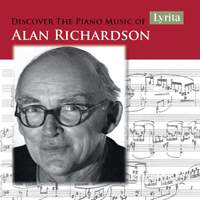In the rich tapestry of 20th-century British classical music, few threads shine as brightly as that of Alan Richardson. Born on February 29, 1904, in Edinburgh, Scotland, Richardson would grow to become one of the most prolific and influential composers of his generation, leaving an indelible mark on the world of music that continues to resonate today.
From an early age, Richardson’s life was steeped in melody. Born into a musical family, he was surrounded by the sounds of various instruments and the rhythms of diverse musical styles. His father, a professional musician, recognized the spark of talent in young Alan and nurtured it with care and dedication. This early exposure to the world of music laid the foundation for what would become a lifetime devoted to the art of composition and performance.
As Richardson’s talent blossomed, so did his opportunities. His formal musical education began at the prestigious Royal Academy of Music in London, where he studied piano and composition. It was here that Richardson’s exceptional abilities truly came to the fore. He distinguished himself not only as a gifted pianist but also as a composer of remarkable promise, winning several awards for his early compositions.
Upon completing his studies, Richardson embarked on a multifaceted career that would span decades and touch countless lives. As a composer, he was prolific and versatile, crafting works that ranged from intimate solo piano pieces to grand orchestral compositions. His musical style, while firmly rooted in the traditions of Western classical music, was infused with a distinctly Scottish flavor, often drawing inspiration from the folk melodies and rhythms of his homeland.
Richardson’s compositions are characterized by their lyrical beauty, harmonic sophistication, and rhythmic vitality. His gift for melody shines through in works such as the charming “Sonatina in C major” for piano and the evocative “The Dreaming Spires,” inspired by the architecture of Oxford. In his chamber music, such as the “Sonata for Viola and Piano” and the “String Quartet in G minor,” Richardson demonstrated his ability to craft intricate musical dialogues between instruments, creating works of profound emotional depth and technical brilliance.
While his solo and chamber works form a significant part of his oeuvre, Richardson also made notable contributions to the orchestral repertoire. His “Scottish Dances” for orchestra showcase his skill in blending traditional Scottish dance forms with classical orchestration, creating a vibrant musical tapestry that celebrates his cultural heritage.
Beyond his work as a composer, Richardson was a dedicated and influential teacher. He held positions at several prestigious institutions, including his alma mater, the Royal Academy of Music, where he shaped the next generation of musicians as a professor of piano and composition. His commitment to music education extended beyond the classroom, as evidenced by his numerous compositions written specifically for developing musicians. Works such as his “Technical Exercises for Piano” and “Easy Pieces for Violin and Piano” have helped countless young musicians hone their skills and develop their musical understanding.
Richardson’s impact on British music extends far beyond his own compositions and teaching. Through his work, he helped to define a distinctly British musical voice in the 20th century, one that honored tradition while embracing innovation. His incorporation of Scottish elements into classical forms contributed to the preservation and evolution of Scotland’s rich musical heritage, ensuring that these cultural treasures would continue to inspire future generations of musicians and listeners.
Today, Alan Richardson‘s music continues to be performed and recorded, introducing new audiences to his unique musical voice. His piano works, in particular, remain popular among performers, prized for their combination of technical challenge and expressive depth. The Alan Richardson Archive, housed at the Royal Academy of Music, stands as a testament to his enduring legacy, providing a valuable resource for musicologists and performers studying his life and works.
As we reflect on the life and career of Alan Richardson, we are reminded of the power of music to transcend time and touch the human spirit. His compositions, with their blend of Scottish charm and classical sophistication, continue to delight and inspire listeners around the world. From the concert halls of London to the classrooms of aspiring musicians, Richardson’s melodic legacy lives on, a lasting tribute to a man who dedicated his life to the art of sound.
In the grand symphony of British classical music, Alan Richardson’s voice remains clear and strong, inviting us to listen closely and discover the beauty and complexity of his musical world. As we celebrate his contributions, we are reminded of the enduring power of music to enrich our lives and connect us to our cultural heritage.


